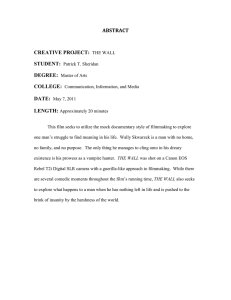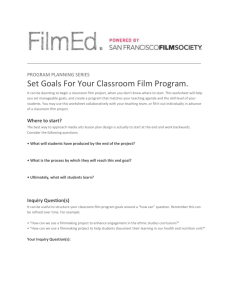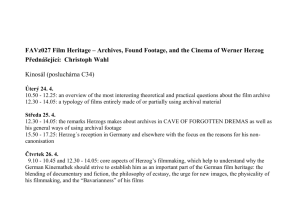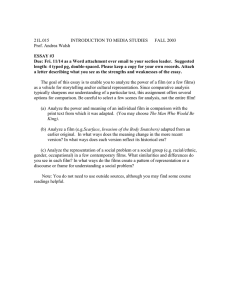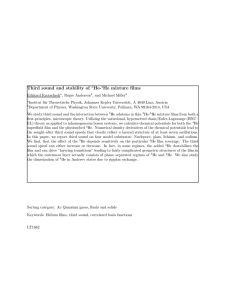! 2015 Report AU’s Center for Environmental Filmmaking
advertisement
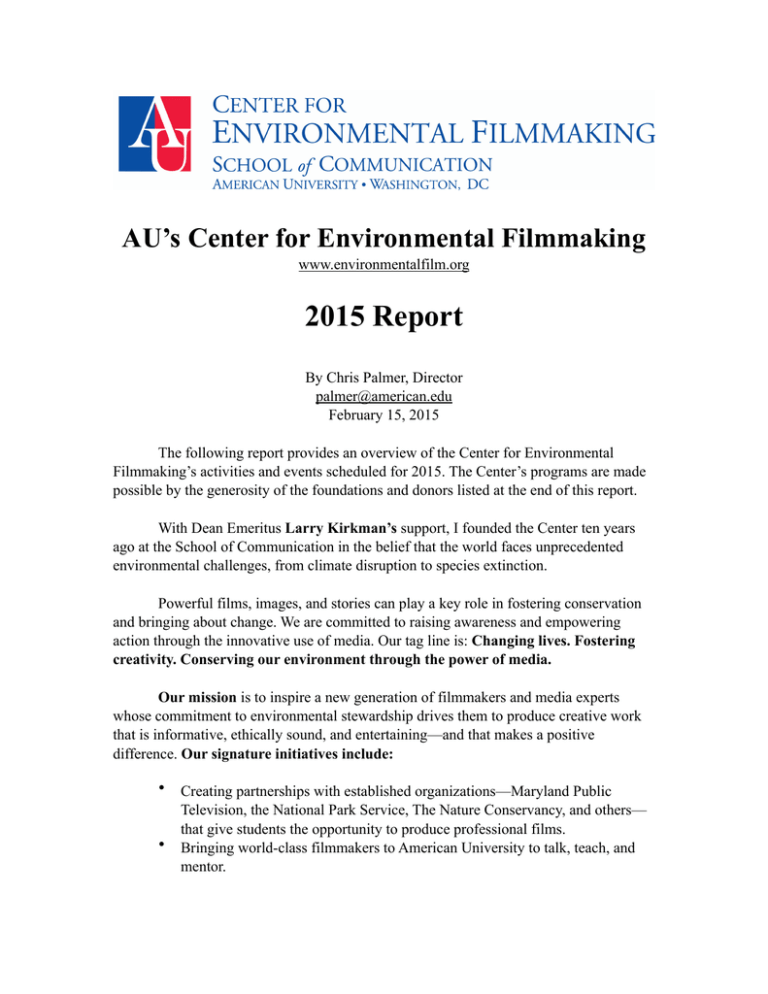
! ! AU’s Center for Environmental Filmmaking www.environmentalfilm.org ! 2015 Report ! By Chris Palmer, Director palmer@american.edu February 15, 2015 ! The following report provides an overview of the Center for Environmental Filmmaking’s activities and events scheduled for 2015. The Center’s programs are made possible by the generosity of the foundations and donors listed at the end of this report. ! With Dean Emeritus Larry Kirkman’s support, I founded the Center ten years ago at the School of Communication in the belief that the world faces unprecedented environmental challenges, from climate disruption to species extinction. ! Powerful films, images, and stories can play a key role in fostering conservation and bringing about change. We are committed to raising awareness and empowering action through the innovative use of media. Our tag line is: Changing lives. Fostering creativity. Conserving our environment through the power of media. ! Our mission is to inspire a new generation of filmmakers and media experts whose commitment to environmental stewardship drives them to produce creative work that is informative, ethically sound, and entertaining—and that makes a positive difference. Our signature initiatives include: ! • • Creating partnerships with established organizations—Maryland Public Television, the National Park Service, The Nature Conservancy, and others— that give students the opportunity to produce professional films. Bringing world-class filmmakers to American University to talk, teach, and mentor. !2 • • • • ! Developing innovative, interdisciplinary, and experiential classes and programs. Promoting the ethical treatment of wildlife and the environment. Awarding student scholarships and fellowships. Supporting and mentoring environmental and wildlife filmmakers in a variety of ways. More information about our programs can be found on our website www.environmentalfilm.org and at www.ChrisPalmerOnline.com. ! Here is a list of our current projects and programs (please see hyperlinks for more information): ! ! 1. Center Scholars program: The Center provides $2,000 stipends annually up to ten top grad students who display academic and creative excellence and who show outstanding leadership qualities. The stipends are used towards developing conservation media projects. This year’s Center Scholars are Vanina Harel, Jamey Warner, and Nick Zachar. 2. Senior Scholars program: When an appropriate candidate can be identified, the Center awards a $5,000 stipend to honor distinguished professionals whose work exemplifies the Center’s mission. The first winner of this award in 2013 was filmmaker Sandy Cannon-Brown. ! 3. Mavis and Sidney John Palmer Scholarship: This scholarship (endowed with $50,000) honors outstanding grad students who have demonstrated a commitment to conservation and wildlife filmmaking. The winners this year were Vanina Harel, Marilyn Stone, Jamey Warner, and Nick Zachar. ! 4. Donors Sheila and Bill Wasserman are funding a $5,000 prize for the student thesis that best reflects environmental impact related to the loss of any wild animal populations and/or major ecosystems, or to the benefits of a plant based diet. The winners this year were Vanina Harel, Sam Sheline, Marilyn Stone, Jamey Warner, and Nick Zachar. ! 5. Challenge Prize: The Center is creating a new annual $15,000 awards program, working closely with AU’s Financial Aid office, to give prize money to graduate students who have overcome (or are overcoming) severe challenges and adversity in their lives (including personal tragedy, poverty, racism, and so on) and plan to use environmental and wildlife films to make the world a better place. Five students will be selected and they will each receive a $3,000 prize. ! !3 6. National Park Service Fellowship: Born through a unique partnership with the National Park Service (NPS), the fellowship program provides grad students with the opportunity to produce films for NPS as paid employees. The fellowship’s flagship project, the web series America’s Wilderness, has produced a diverse collection of films to celebrate the 50th Anniversary of the Wilderness Act. Recent NPS Fellows include Sarah Gulick, Erin Finicane, and Sylvia Johnson. ! 7. Maryland Public Television partnership: Our long-standing partnership with MPT gives students the opportunity to produce professional films for Chesapeake Bay Week on public television stations. Over the last six years, thanks to Sandy Cannon-Brown’s leadership, the student-produced films from this program have received numerous awards, including five Student Emmys and several CINE Golden Eagles. Emmy Award-winning executive producer Mike English has now taken over from Sandy and last semester his students produced a 30 minute film, Chesapeake Villages, which will air on MPT and other PBS stations in April 2015, and also play at the Environmental Film Festival. ! 8. NOAA Oceans for Life program: Oceans for Life gives two or more grad students the opportunity to acquire field experience working with NOAA and the National Marine Sanctuaries Foundation while collaborating with National Geographic or the Jean-Michel Cousteau’s Ocean Futures Society. They serve as filmmaking mentors to high school students from the Middle East and the US. ! 9. Prince Charitable Trusts’ films on sustainable farming: The Center works with the Prince Charitable Trusts to produce films on sustainable and profitable farming. Aditi Desai produced Farming for the Future in 2013, and Aditi Desai and Vanina Harel have just completed a second film on sustainable farming called Fifty Years of Farming: For Love & Vegetables. We will embark on a third film in the series this spring. These films will be screened at the Environmental Film Festival at 7 pm on Saturday, March 28 in the Doyle/Forman Theater at SOC. ! 10. MFA concentration in Environmental and Wildlife Filmmaking: Under Brigid Maher’s leadership, the MFA program is developing three concentrations, one of which is in Environmental and Wildlife Filmmaking. The Center is working with Film and Media Arts faculty to implement this exciting development. In January 2015, these concentrations were approved at the university level. ! 11. Classroom in the Wild in the Chesapeake Bay: This outdoor class offers students and the public a one week program in March on the Chesapeake Bay as an introduction to the challenge and excitement of environmental filmmaking. It is led by filmmakers Jamey Warner and Steve Droter. !4 ! 12. Classroom in the Wild: Extreme HD Alaska: Under the leadership of Larry Engel and Brian Horner, this summer class offers students and the public a three week, three credit immersive course in HD filmmaking under challenging environmental and expeditionary conditions in Alaska. ! 13. Funding and producing films: The Center provides funding and filmmaking expertise to students and others making films on conservation. See Center Vimeo website and Center YouTube website. ! 14. Events at 7 pm Tuesdays in the Doyle/Forman Theater in McKinley with renowned filmmakers and environmental advocates. The Center creates and hosts 15-20 events a year, attracting large public and student audiences. Recently our speakers have come from Animal Planet, Greenpeace, Smithsonian, National Geographic, and PETA. ! 15. Eco-Comedy Video Competition: The Center created this annual international competition, sponsored by The Nature Conservancy’s Maryland/DC chapter, to encourage the use of humor to promote conservation. We receive about 100 submissions annually from all over the world and the winner is awarded a $2,000 cash prize from TNC. ! 16. Visions Festival award for Best Environmental Film: The Center awards an annual $2,000 cash prize for the best environmental film at the Visions Festival. ! 17. “An Evening with Chris Palmer” annual event at the Environmental Film Festival: This year at 7 pm Tuesday, March 24 at AU, I’ll discuss my new book Confessions of a Wildlife Filmmaker: The Challenges of Staying Honest in an Industry Where Ratings Are King and will show numerous clips. ! 18. Student Short Environmental Film Festival (7 pm Wednesday, March 25, 2015 at AU): This annual event is part of the Environmental Film Festival and is curated by Sandy Cannon-Brown and Brad Forder. We exhibit and celebrate the best conservation short films produced by students nationwide. ! 19. Panel at Environmental Film Festival: “OK, I’ve Watched the Film—Now What?” (7 pm Thursday, March 26, 2015 at AU): The Center and EFF sponsor this event annually to draw attention to the need for conservation films to be far more than distracting entertainment. Multifaceted and multilayered campaigns are essential to produce real results and have a measurable impact. ! !5 20. Environmental Film Festival in the Nation’s Capital: Every March, the Center hosts about eight EFF events at AU and is deeply involved in creating and planning them. ! 21. Shooting in the Wild campaign (book and film) to reform wildlife filmmaking practices: This ongoing campaign is inspired by my book Shooting in the Wild, now in its second printing. In 2014, SOC produced a companion film (of the same name) hosted by Alexandra Cousteau, directed and produced by Ed Beimfohr, and produced and edited by Frank Fitzmaurice, which aired on public television stations nationwide. The film was made possible by generous grants from the Park Foundation, the Shared Earth Foundation, and the Norcross Foundation. My new book, Confessions of a Wildlife Filmmaker, which is highly critical of some major television networks, will be published in March 2015 to further this campaign. ! 22. Filming in Costa Rica on carbon offsetting: During the spring semester of 2014 graduate students from AU’s School of International Service, Kogod School of Business, and School of Public Affairs, participated in a practicum addressing AU's commitment to achieve carbon neutrality by 2020. In an attempt to mitigate carbon emissions from air travel, AU is paying farmers to protect their tropical rainforests in a hotspot of biodiversity in Costa Rica's central volcanic mountain range. Led by Chris O'Brien, AU's Director of Sustainability, and Dr. Kenneth Conca, AU Professor and Program Director of Global Environmental Politics, the SIS students traveled to Costa Rica to assess the environmental and social impacts and effectiveness of AU's payments for these ecosystem services. Through coordinated support from Larry Engel and Ken Conca, the group was also joined by School of Communication graduate students Nick Zachar and Jazmin Garcia, who documented the students as they interviewed local organizations and landowners. This interdisciplinary project ultimately will provide AU with a recommendation on whether to continue the current project in Costa Rica or to look for alternative projects in the future. ! 23. Potomac/Chesapeake Bay watershed (DC H2O): An interdisciplinary 1-credit self-study course through the University College program was designed to study water issues in Turkey. Professors Larry Engel and Kiho Kim (CAS) had designed the course, but because of political turmoil in the region, the spring trip was cancelled. However, Engel and Kim redesigned the course to study the Potomac/Chesapeake Bay watershed, called DC H2O. Ten students are now engaged in the project. ! 24. Sponsorships of many film festivals, including the Environmental Film Festival in DC, the BLUE Ocean Film Festival and Conference, the Jackson Hole Wildlife Film Festival, the International Wildlife Film Festival, and the !6 Blue Vision Summit. In addition to sponsorships, the Center also helps students attend these festivals. For example, the Center paid for the expenses of five students to attend the American Conservation Film Festival. ! 25. LinkTV and our work with Earth Focus: Filmmaker Jamey Warner has done excellent work as a producer, cinematographer, and editor of programs on climate change, illegal wildlife trade, the changing geopolitics of the Arctic and innovations in sustainable farming for Earth Focus, the prime time weekly environmental program broadcast on both KCET (in California) and Link TV (nationally). Earth Focus, headed by Raisa Scriabine, reaches over 5.1 million actual viewers annually on both networks. Earth Focus is also streamed at www.linktv.org/earthfocus. ! 26. Three HD cameras for student use, thanks to the Norcross Foundation. Many students have taken advantage of this equipment, including students in our Classroom in the Wild programs. ! 27. Discover the World of Communication summer program for high school students under Sarah Menke-Fish’s leadership: The Center gave a $775 Scholarship to a 2014 MCPS Environmental Film Festival Winner to participate in the Discover the World of Communication Program. The Center will continue this support in 2015. ! 28. Under Sarah Menke-Fish’s leadership, more than 350 students from Montgomery County Public Schools, Howard County Public Schools and DC Public Schools participated in five hands-on environmental film workshops held in October, November, January and February 2014 at AU, AFI and on location at select middle and high schools. Forty-five AU faculty, AU Alums, MFA and MA candidates and Film and Media Arts students worked with the students to guide them and support them with their filmmaking efforts. ! 29. In the classroom, Professor and Associate Director Maggie Burnette Stogner works with students to develop ideas and productions for nonprofit environmental groups and for film competitions such as the Center’s Eco-Comedy Video Competition. She invites guest speakers to share their experiences, such as alum Ellen Tripler who produced the award winning Dying Green with support from the Center. This extraordinary thesis film won a coveted Student Academy award and a professional-level CINE Golden Eagle award, among others. ! 30. Professor Stogner continues to serve as an advisor to the Center and to the Center’s award-winning students. She advises thesis and capstone projects, such as Center Scholar Vanina Harel who recently received a grant of $2,000 from the !7 Center. With the assistance of the Center and the support of faculty, students are able to launch their careers in wildlife and environmental filmmaking. Professor Stogner takes an active role in supporting students as they transition to professional careers, providing letters of recommendations to key organizations such as the National Geographic Society and Discovery, and to many environmental associations. ! 31. In October 2014, Professor Stogner moderated a Center for Environmental Filmmaking panel, Behind the Scenes: The Making of America’s Wilderness, for SOC’s Signature Series on Environmental Filmmaking. The panel included National Park Service film producers Chuck Dunkerly, Erin Finicane (AU SOC '13), and Sarah Gulick (AU SOC ’14). This well-established Center speaker series showcases a wide range of significant films and filmmakers and the impact they have on changing our world. ! ! ! ! ! 32. Recent interviews and articles featuring the Center have appeared in Mother Jones, National Public Radio, Washington Post, Global CEO, the Eagle, and other publications, and can be found here, here, here, here, here, here, here, and here. ***** I thank Dean Jeff Rutenbeck and Prof. John Douglass for all their support. And I thank Larry Engel, Sandy Cannon-Brown, Sarah Menke-Fish, and Maggie Burnette Stogner—the four Associate Directors of the Center—for all they have done to contribute to the depth and breadth of the Center’s programs. ! The Center for Environmental Filmmaking’s activities and programs are made possible by the generosity of the following individuals, foundations, corporations, and other organizations. I am honored to recognize them and to thank them for their support: ! Wallace Genetic Foundation, Frances & Benjamin Benenson Foundation, Shared Earth Foundation, Park Foundation, Saint Paul Foundation, Turner Foundation, Prince Charitable Trusts, Herbert W. Hoover Foundation, Ramsay Merriam Fund, Henry Foundation, Mead Family Foundation, Norcross Wildlife Foundation, Ernst & Young Ltd. Liability Partnership, Merrill G. & Emita E. Hastings Foundation, T. Rowe Price Associates Foundation, and The Nature Conservancy. ! Special thanks to Joan Murray, Bill Benenson, Caroline Gabel, Gil Ordway, Caroline Ramsay Merriam, Elysabeth Kleinhans, Elizabeth Ruml, Lucy Waletzky, Wool Henry, Angel Braestrup, Lacey Hoover, Colton Hoover Chase, Mark !8 Butterworth, Betsy Mead, Diana Mead, Christelle Siohan, Sheila and Bill Wasserman, Amy Panek, Lisa Peterfreund, Todd Robinson, Kristin Pauly, Leonard Berman, John McMurray, Kay Summers, Whitney Hall and other generous supporters. ! ! ! ! ! ! ! ! ! ! ! Center Report 2015
